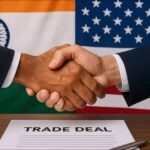Tracing Success: How Technology Drives Value In Supply Chain

The concept of integrating transparent relationships with digital and physical traceability tools harbours broad potential. This approach could be tailored to support traceability across various other commodities, writes Alison Ward
Global supply chains have reached unprecedented levels of complexity. Companies now face a growing imperative to achieve comprehensive visibility across their supply networks. Simultaneously, there is mounting pressure from both consumers and regulators for enhanced transparency – a demand that is entirely justified. Consumers seek products that guarantee safety, ethical sourcing and sustainability. Consequently, businesses bear the duty and obligation to furnish such assurances, substantiated by precise, verifiable claims.
Traceability plays a pivotal role in achieving this level of transparency, fostering trust between companies and customers. In the realm of food, for instance, traceability empowers a company to track the journey of a food product and its constituents through every phase of the supply chain. This capability enables companies to disclose the origins of food to consumers, while facilitating prompt and accurate recalls in the event of safety concerns.
Likewise, the fashion industry stands to gain from heightened traceability measures. Given the intricate global web of supply chains, retailers offer products crafted from textiles that have undergone numerous processing stages and exchanges. In the absence of robust traceability systems, pinpointing the original source of a garment or fabric becomes challenging.
Consider cotton as an example: following its harvest, it proceeds through stages of ginning, spinning, dyeing and ultimately garment production, often occurring in disparate locations. Given that nearly half of all textiles rely on cotton, this process results in a sprawling and intricate global network encompassing producers, suppliers and intermediaries.
As a consequence, only a third of the top 100 clothing companies actively monitor their supply chains, as indicated by research conducted by the United Nations Economic Commission. A significant majority (69%) cite the fragmentation and complexity inherent in the global business landscape as a major impediment, a challenge likely mirrored across various other sectors.
Supply chain visibility presents numerous challenges, yet viable solutions exist. While cultivating effective, trusted relationships throughout the supply chain serves as a fundamental starting point, technological advancements offer a growing array of tools to bolster and refine traceability efforts.
On the digital front, fashion brands and retailers must have access to digital data to enable real-time monitoring and tracking. This provides companies with heightened visibility into their supply chains, a deeper comprehension of movement of goods – from raw materials to finished products – and the capacity to better support their suppliers.
Moreover, when digital tracing alone falls short, the emergence of physical traceability tools furnishes businesses with a secure means of identifying and authenticating all materials and products. This enables them to communicate their origins confidently and credibly.
In the cotton sector, CottonConnect’s TraceBale platform serves as an exemplary case. It enables brands to trace their raw materials and products utilising various identifiers, including holograms on cotton bales, QR codes from farmers and unique DNA-based markers. Once the marker is affixed to the fibre, all materials manufactured from that cotton can undergo testing at any stage of the supply chain. This method validates the specific fibre used in manufacturing a particular garment, encompassing details such as origin, quality and sustainability criteria.
By integrating physical and digital traceability, this approach offers distinct advantages that can enhance supply chain efficiency, eliminate unethical practices, deter fraud and foster consumer trust. It represents a strategy for untangling the complexities of globalised supply chains, a feat that has been successfully achieved for more than a decade. Brands like The White Company, Mark’s, and C&A, amongst others, have benefited immensely from this approach – with 1.4 billion sustainable cotton garments having hit the shelves of global retailers, thanks to the amount of sustainable cotton produced and linked to transparent supply chains.
As consumer awareness grows and regulatory pressures mount, more suppliers are gravitating towards sustainable practices. Therefore, fashion brands should initiate transparent dialogues with their suppliers, outlining how all stakeholders stand to gain from textile traceability initiatives. Without robust relationships, traceability tools may lack the necessary potency, as achieving full visibility requires active participation from all entities within the value chain.
The concept of integrating transparent relationships with digital and physical traceability tools harbours broad potential. This approach could be tailored to support traceability across various other commodities, such as different textiles, precious minerals and even food products. Indeed, the fundamental premise of assigning a unique identifier to each raw material for both physical and digital tracing could be extrapolated to encompass a wide array of goods.
In a changing world where the climate crisis and associated social challenges loom large, companies are increasingly acknowledging their responsibility for their impact on both people and the planet. Over the past decade, we have had the privilege of collaborating with forward-thinking companies committed to traceability. Now, proven technologies exist to enable others to substantiate their own responsible practices and pursue enhancements. Authentic supply chain transparency is achievable. It is how we’re revolutionising the fashion sector, serving as a catalyst for the adoption of more sustainable and transparent practices across industries.
CottonConnect Promotes Sustainability At Bharat Tex 2024
CottonConnect, a leading organisation driving responsible sourcing and resilient supply chains in the textile industry, participated in Bharat Tex 2024 held from February 26-29, 2024, in New Delhi. CottonConnect‘s mission was well aligned with Bharat Tex’s theme and its leadership team actively contributed to the discussions through diverse sessions.
Alison Ward, CEO, CottonConnect, emphasised the importance of sustainability, stating, “As the world’s second largest cotton producer, India can play a crucial role in the journey of garment supply chains towards sustainability, aligning with a global demand for brands to focus on ESG. India can lead collaborations to boost trade and investments and support global players in meeting their ESG and sustainability targets by 2027. We at CottonConnect are committed to brand responsibility and accountability, farmer well-being and empowerment – contributing to shaping a sustainable future for the global and Indian apparel industry.”
Kinner Lakhani, COO, who spoke at the Building Resilient Global Apparel Value Chain session at Bharat Tex 2024, added, “By leveraging its strengths and fostering responsible practices, India can become a key player in building a more resilient and sustainable global apparel supply chain. Better farming practices, capacity building of farmers and employing technology and innovation to make raw materials traceable are pivotal in this journey.”
Hardeep Desai, Global Head – Farm Programmes, highlighted India’s potential, saying, “ESG and sustainability are the future of the textile industry. It is crucial to ignite discussions on exploring technologies and practices that enhance visibility and foster transparency for accountability, ethical sourcing and responsible production practices.”














